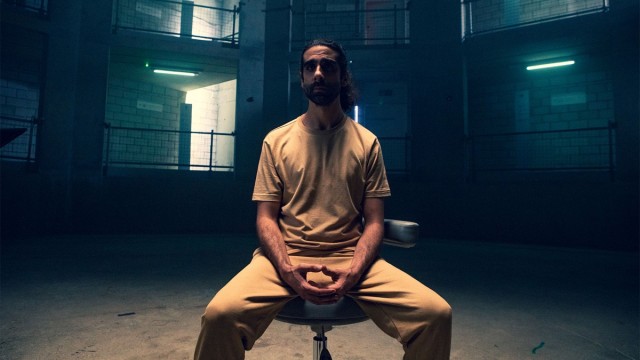Although science fiction often centres on futuristic visions, it is most impactful when it mirrors contemporary society. A prime example is Nadia Latif’s haunting sci-fi short They Heard Him Shout Allahu Akbar, which depicts a world where mind control is employed in the “rehabilitation” of newly released prisoners.
Created as part of the Foresight anthology – a collection of five short films exploring alternate realities through the lens of five Black British directors – Latif focuses her gaze on the Muslim experience. In her film, we witness a man (Zaid) implanted with a device that renders him incapable of performing even basic functions whenever it deciphers his experiences as misleading or dangerous.
Opening with a interview session, where Zaid is told (by an unidentified voice) he is “free” now, we witness him being bombarded with images from the Middle East, before a futuristic looking nurse (Emma D’arcy) inserts that aforementioned device into his forearm. The following six-minutes of the film follows him on the outside as we witness everyday occurrences – witnessing people exiting a mosque or hearing foreign language on the television – activating his implant, causing him intense pain and nausea.

Scott Karim stars as Zaid in They Heard Him Shout Allahu Akbar
Written by Omar El-Khairy, the pair didn’t initially intend to create a science-fiction film. However, they saw the limitless narrative options of the genre and recognised an opportunity to immerse their audience in the central character’s perspective. Aiming to take “a really popular sci-fi trope” and apply it to a “totally original protagonist,” they decided on “mind control and a Muslim protagonist” for their short.
Despite the creative freedom inherent in science fiction, They Heard Him Shout Allahu Akbar remains a grounded film set in a largely familiar world. Shot by cinematographer Olan Collardy –whose work has often been featured on our pages – his intimate photography stays close to the excellent Scott Karim, who portrays Zaid’s suffering with fierce intensity.
Given Latif’s background in theatre, it’s unsurprising that her short film prioritises character and performance over special effects and world-building. It’s this approach that lends the film its impact, immersing us in Zaid’s life and compelling us to reflect on what the director describes as “the everyday reality for many Muslims”. A filmmaker we’ve followed since her debut short White Girl premiered at film festivals in 2019, Latif is now in post-production on her first feature, The Man in My Basement.

 Rob Munday
Rob Munday